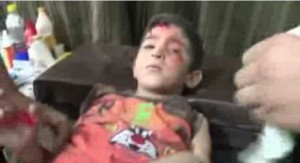Syrian Children Pay the Price of War

Six-year-old Tasneem Jum’a didn’t know that the last time she would see her parents and seven of her eight siblings would be on January 2, 2013. That day, warplanes bombed her family’s two-story home in the Hay Al Asafeer neighbourhood of Muaddamiyyah, a suburb of Damascus. Tasneem’s parents and six of her siblings died on the spot, while Tasneem and her brother Mahmoud were taken by Free Syrian Army fighters to a field hospital nearby.
Tasneem survived, although her face is seriously disfigured. Her brother died from his injuries two hours after they were brought to the hospital. Today, Tasneem lives with her grandparents and her sister Fatima, 20, who lost her husband in a separate bombing.

Tasneem’s story is just one of many that illustrates the high price paid by Syrian children since the start of the crisis, now in its third year. Nearly 6000 children under the age of 16 have been killed since March 2011, according to the website Syrian Martyrs, which collects information from several sources inside Syria and abroad. On Sunday, April 14, another 30 children were reportedly killed in an airstrike on the Qaboun suburb of Damascus.
The United Nations’ Children’s Fund, better known as UNICEF, dedicated a special report in March to the tragic conditions affecting Syrian children inside Syria as well as those who fled with their families to neighbouring countries. The report states that among the 4 million Syrians affected by the conflict, 2 million are children. Many children have been killed, injured or sexually assaulted, and lack access to basic services such as education and even clean water. The report also warns that children are being recruited to fight.
Hassan Ayo, a member of the Committees for the Defense of Democratic Freedoms and Human Rights in Syria, which operates clandestinely inside Syria, blamed the regime for violating international conventions and causing the deaths of thousands of children by targeting civilian areas with shelling and air attacks.
At the same time, Ayo said, the legislation designed to protect children from human rights violations must be strengthened, and admitted that opposition militants also commit violations, particularly by recruiting fighters under the age of 18.
“There is a need to improve and strengthen the international and domestic legal standards,” said Ayo. “The recruitment [of] those under 18 into the ranks of the Free Syrian Army is a crime against humanity, and a painful violation of the rights of children and minors…which in itself is a flagrant violation of the laws of the Geneva Convention.”
In addition to the legislative reform process, which will no doubt take time, children’s rights advocates draw attention to the more immediate problem of protecting children in areas affected by fighting and the deteriorating conditions in the field where medical and psychological relief are practically non-existent. Such services are necessary if the long-term damage to children is to be mitigated.
Dr. Mahmoud, the doctor who treated Tasneem and her brother Mahmoud and declined to give his full name, recalled that the girl’s mental state when she arrived at the hospital was very bad; she kept asking about her siblings and parents who had been killed. Dr. Mahmoud admits he was unable to provide the psychosocial support the child so desperately needed.
“Currently we are not providing any psychological care for children because we lack such specialized medical staff, not to mention that we are working in a war zone and all our attention is focused on treating the wounded,” the doctor told The Damascus Bureau.
The field clinics in Muaddamiyyah, like most hospitals in areas of fighting, suffer from an acute shortage of medicine and medical supplies. The area has been under siege by the Syrian government’s army for three months and is shelled daily. There are snipers posted at the main entrances. All of this makes providing relief and aid, including vital medical supplies, difficult and dangerous.
After 21 days in the hospital, Tasneem came to live with her grandparents, her sister Fatima and her two children, along with Hiba, the wife of Tasneem’s uncle who was killed by artillery fire, and Hiba’s 16-month-old son, Rabia. The whole family is struggling to survive on the grandfather’s pension, which amounts to 14,000 Syrian pounds (about $140) per month. This sum must cover not only basic necessities but also extra expenses for the children.
“Rabia, like any other child his age, needs special care. He needs infant formula, diapers, and constant medical attention,” said Hiba. “After my husband was killed we no longer have a breadwinner. The Free Syrian Army gave me 4,000 pounds (about $40) as compensation, but it is so little I was forced to sell my jewellery to buy what Rabia needs.”
Tasneem appeared in good health when The Damascus Bureau visited her at her grandparents’ house. It had been 28 days since the bombing, and she was slowly healing. She was shy, and would say nothing other than that her parents and siblings were in heaven now. Her scarred face made her even more timid, and she kept trying to hide behind her hands. Her face may never heal completely, because, as her sister Fatima said, the ointments needed to repair her skin are not available in their area.
